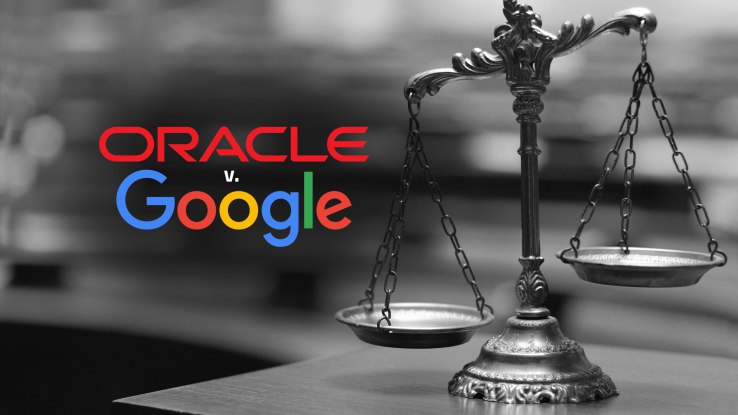

If you didn’t already know the jury’s decision in Oracle’s long-running lawsuit against Google, you wouldn’t have been able to guess it from looking at either company’s legal team yesterday. Moments after the verdict was read, both sets of high-powered intellectual property lawyers huddled up and spoke softly, without any outward signs that Oracle had just lost a crucial round in its battle to extract up to $9 billion from Google’s pockets.
The jury found that Google’s implementation of Java APIs in Android was fair use, a decision that will not only save Google from writing a huge check but will also give developers a little breathing room as they build their own Java products. But it’s a complicated victory because a prior court already found that the APIs in question are copyrightable, and even the fair use win might not last forever. Oracle has already said it will appeal.
“It’s interesting because APIs are still copyrighted,” Duke computer science professor Owen Astrachan says. Astrachan testified in the copyright and fair use cases as an expert witness for Google, and said he jumped up and down in his hotel room when he saw news of the verdict on Twitter. “Does every use have to be tried as a fair use case? It’s interesting. Oracle has deep enough pockets where they can go after anybody.”
The question of whether they’ll have to defend their work in court still lingers for developers. Although a developer’s reimplementation of Java may qualify as fair use, no one wants to end up fighting about it in court against a deep-pocketed corporation like Oracle. Advocacy organizations like the EFF have argued that it would be simpler and safer for the developer community to not restrict API labels under copyright at all.
Google’s lawyers structured their arguments to the four core tenets of fair use, a strategy Astrachan says seems to have played well with the jury. Attorneys and witnesses proposed analogies for implementing code that seems bizarre — the APIs in question were compared to filing cabinets, hamburgers, electrical outlets, steering wheels, and even the Harry Potter series over the course of the two-week trial — but the strange comparisons ultimately had the desired effect.
“Maybe the hamburger and the outlet and the steering wheel — I think they must’ve worked,” Astrachan said, adding that after the jury’s decision was announced, “We were joking about going to get hamburgers.”
Instead, Google’s legal team ended up celebrating with champagne.
The celebratory mood didn’t extend to Oracle’s offices. Intellectual property attorney Annette Hurst, who represented Oracle in the case, published a blog post on LinkedIn today denouncing the verdict. She suggested the Oracle team was blindsided by the decision, writing, “No copyright expert would have ever predicted such a use would be considered fair.”
“Not only will creators everywhere suffer from this decision if it remains intact, but the free software movement itself now faces substantial jeopardy,” Hurst added. “It is hard to see how ownership of a copy of any software protected by copyright can survive this result. Software businesses now must accelerate their move to the cloud where everything can be controlled as a service rather than software.”
Hurst’s argument that Google harmed open source software with the creation of Android echoed the comments made by Oracle co-CEO Safra Catz during her testimony. Catz said that the introduction of Android forked the Java open source community, splitting developers between the two platforms.
Hurst closed her post by chastising the development community and invoking Richard Stallman, an activist and programmer who helped pioneer the free and open software movement. “You should have been on Oracle’s side in this fight. Free stuff from Google does not mean free in the sense Richard Stallman ever intended it,” she wrote.
After five years of legal wrangling, it’s not likely that many of Oracle’s outspoken critics will change their minds. But there’s always the appeal.

Featured Image: corgarashu/Shutterstock

